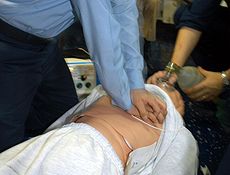The American Heart Association put out a statement in March of this year (2013) stating that improvements needed to be made in the way hospitals deal with in-hospital cardiac arrests. Two main points were made:
- Improvements in the readiness of hospitals and the health care providers in giving evidence based quality care during cardiac arrests, and after, can improve survival rates.
- There needs to be more accountability and standardization of data collection and reporting from in-hospital cardiac arrest care so that institutions survival rates and performance can be measured and compared.
- Establish competency of all hospital care providers in recognizing cardiac arrest, the performance of chest compression’s and the use of AED’s.
- Mandating that hospitals report rates per 1000 of admissions of do-not-resuscitate before arrests occur.
- Modifying billing codes to allow collection of more specific and accurate data for in-hospital cardiac arrest.
- The authors also suggested different guidelines for in-hospital cardiac arrests vs. out-of-hospital cardiac arrests.
The care of the cardiac arrest patient does not stop with the resuscitation but includes efforts to decrease negative outcomes post resuscitation. If the patient survives their cardiac arrest they then may face complex medical problems known as Post-Cardiac Arrest Syndrome (PCAS). PCAS incorporates the following medical issues:
- Brain injury
- Heart dysfunction
- Systemic ischemia/Reperfusion response
- Conditions that cause or are caused by Cardiac Arrest
Post-Cardiac Arrest Syndrome Care has the following stages:

- First 20 minutes after return of spontaneous circulation
- 20 minutes to 6-12 hours: Early intervention is the most effective
- 6-12 hours to 72 hours: injury pathways still active; aggressive treatment recommended
- Beyond 72 hours: recovery phase; outcome more predictable
Factors Influencing Prognosis of Cardiac Arrest Victims
- Factors before arrest
- Age
- Ethnicity
- Poor health
- Factors during cardiac arrest
- Time between arrest and start of CPR
- Quality of CPR
- Whether there was any neurological signs during or immediately after CPR
- Factors after cardiac arrest and resuscitation
- Neurologic function: generally poor function equals poor prognosis. Some patients suffer a stroke post cardiac arrest.
- Whether therapeutic hypothermia (intentionally lowering the patient’s body temperature) was used.
Above information obtained from the American Heart Association Web site.
Leave a Comment